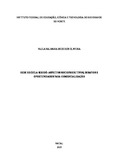Rede recicla Seridó : aspectos socioprodutivos, desafios e oportunidades para comercialização

Visualizar/
Data
2023-11-07Autor
Oliveira, Paula Salmana Medeiros
http://lattes.cnpq.br/3089971354477337
Metadado
Mostrar registro completoResumo
The social inclusion of waste pickers in the management of solid waste is part of the National
Solid Waste Policy, however, the challenge for the public administration to implement actions
that enable the return of waste to the production cycle and the increase of recycling rates in the
country. From this perspective, Rede Recicla Seridó was formed by six associations of waste
pickers that operate in the Seridó-RN region, with the purpose of overcoming marketing
difficulties. The objective of this research was to analyze the socioeconomic and environmental
aspects of the waste picker enterprises that make up this network and the challenges faced in
commercialization. The social and productive aspects of the network were analyzed, based on
the field survey, where structured interviews were carried out with the collectors and managers
of the enterprises, using a questionnaire as a data collection instrument. From the interviews,
the matrix of strengths, opportunities, weaknesses and threats (SWOT) was used to identify the
challenges faced by the Network. The results point to associations with a small number of
collectors that vary seasonally in relation to the average income obtained, consisting of 5 to 15
collectors, with a predominance of male people, aged between 30 and 49 years and that 65% of
these workers are not they earn a minimum wage in the activity, coupled with low education
and the presence of 23% illiterate, reflecting a vulnerable condition. In the organizational and
productive aspect, there was deficient infrastructure and insipid support from public authorities.
In general, associations have small warehouses, loaned vehicles and use of a press that
optimizes cardboard production, which is the material with the highest volume sold. The
challenges highlighted were the lack of technical and management capacity of the collectors,
who depend on partners to support social and economic demands, with a low volume of
materials sold, deficient infrastructure, lack of environmental education and little effectiveness
of public policies for hiring for the environmental services provided. The formalization of the
Network at the end of 2022 with the creation of a cooperative was fundamental for participation
in reverse logistics programs, expanding marketing possibilities, new partnerships for training
and improvements in the work environment. Dependence on public authorities is still the
biggest challenge to be faced, requiring business training and the permanent mobilization of
society for the sustainability of associations. Due to this diagnosis, this work culminated in the
elaboration of a social mobilization guide, which presents concepts on the subject with relevant
information, aimed at social educators, environmental agents and municipal managers, for the
exercise of citizenship, aiming to foster new dynamics, supporters and partners necessary to
improve the analyzed network.



